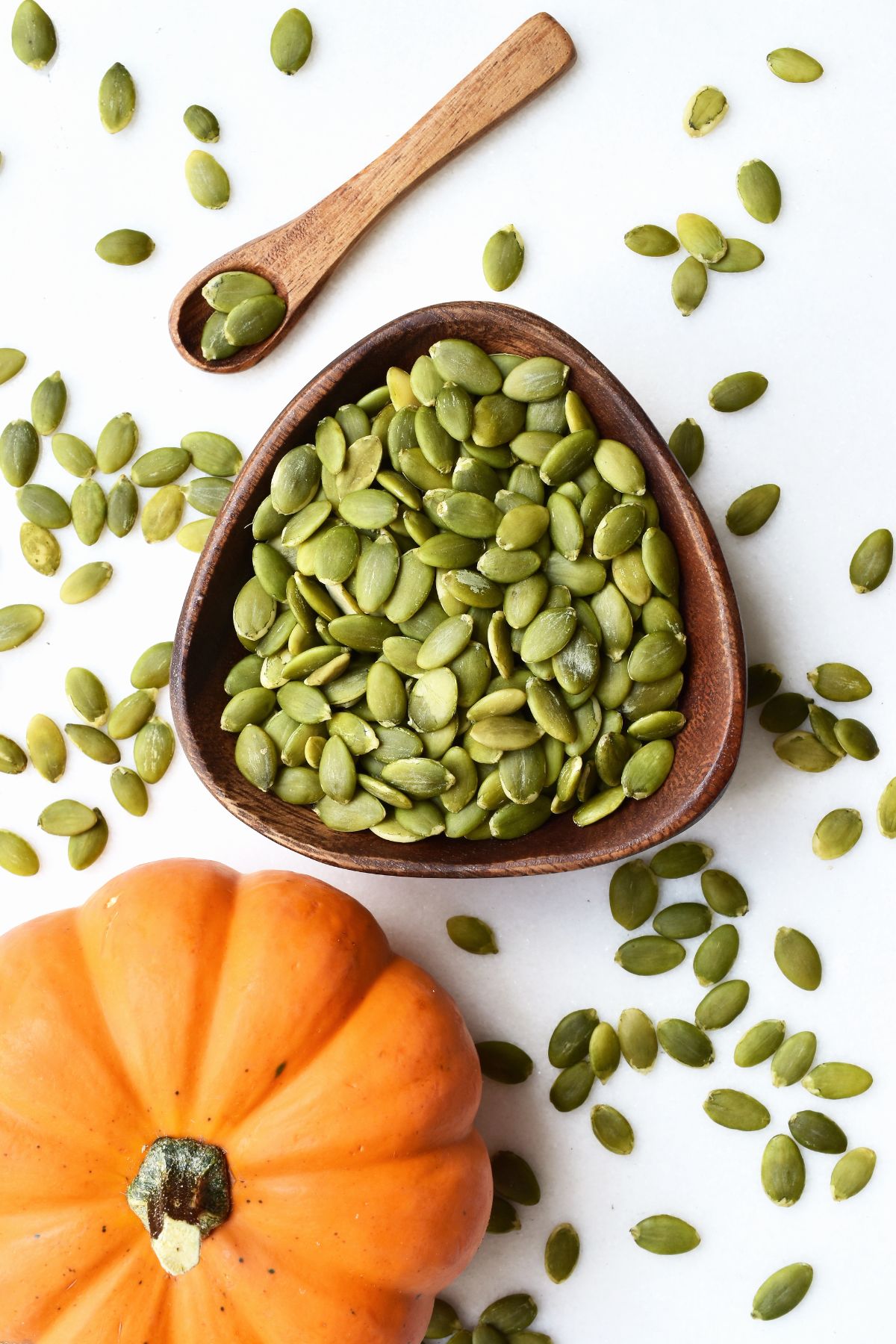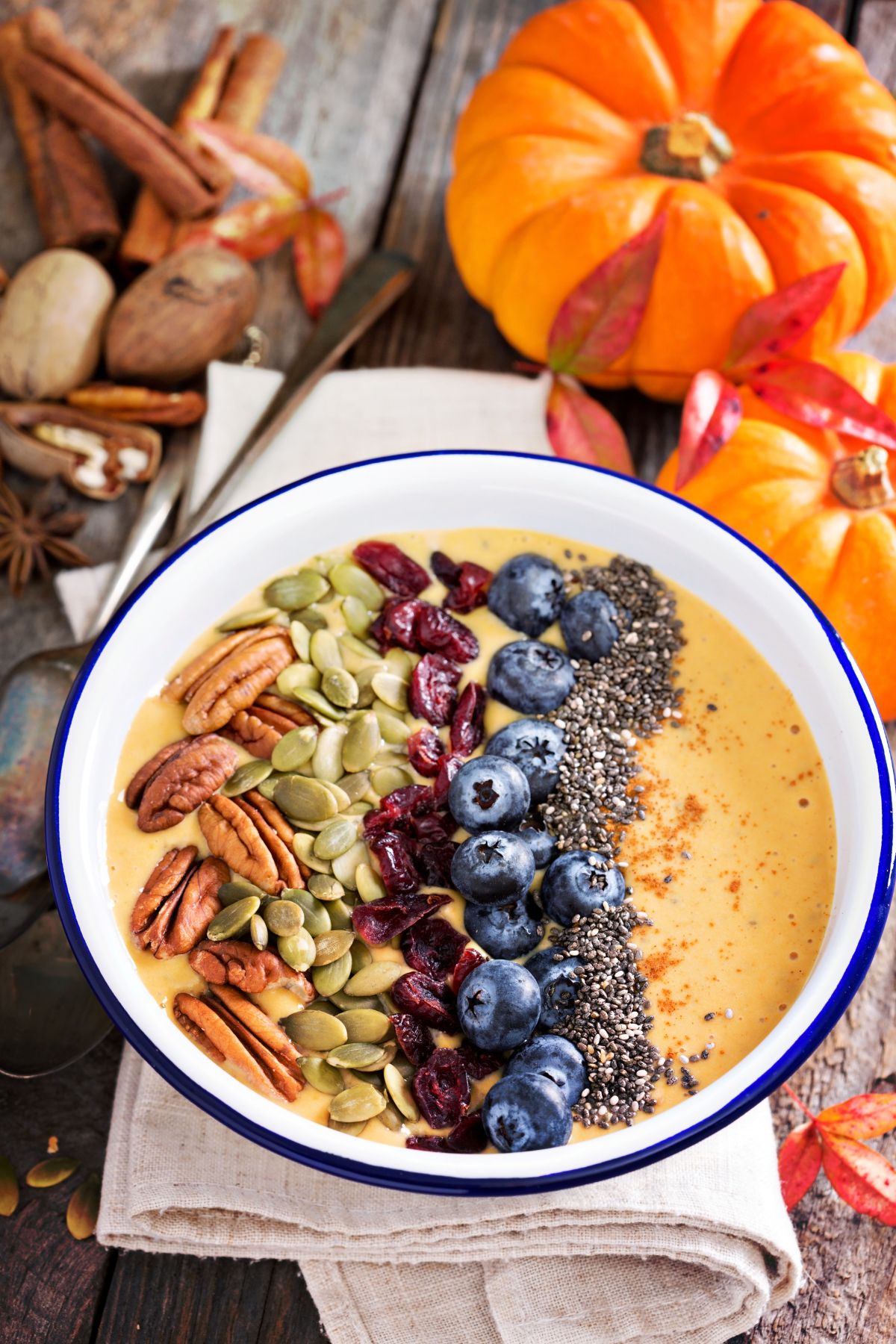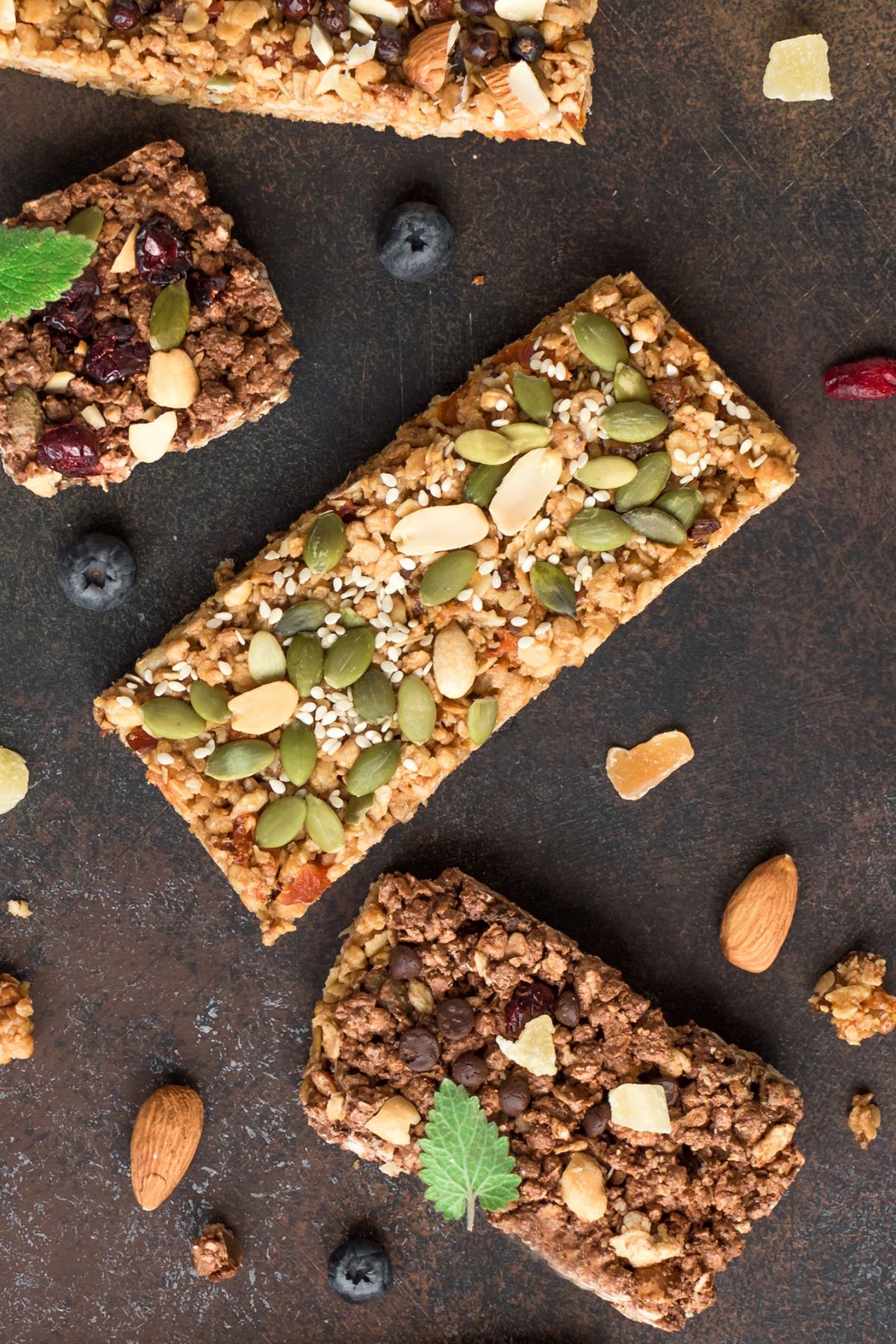Are pumpkin seeds low FODMAP? This blog post explores and clarifies the relationship between pumpkin seeds and the low-FODMAP diet. Understanding how this popular snack fits into a FODMAP-friendly lifestyle is crucial for individuals looking to manage their symptoms effectively while enjoying a variety of nutritious foods. Let’s delve into the world of FODMAPs, uncover the nutritional benefits of pumpkin seeds, and discover how they can be safely and deliciously incorporated into a low-FODMAP diet.

Learn about FODMAPs in pineapple, coffee, corn, grapes, beans, and peanut butter.
Table of Contents
FODMAPs are a group of carbohydrates that are poorly absorbed in the small intestine, leading to symptoms in individuals with irritable bowel syndrome (IBS) and similar gastrointestinal disorders. The acronym stands for fermentable oligosaccharides, disaccharides, monosaccharides, and polyols. These include various sugars that can draw water into the intestine and ferment in the gut, causing gas, bloating, and discomfort.
FODMAP stands for fermentable oligosaccharides, disaccharides, monosaccharides, and polyols.
Researchers at Monash University created the low-FODMAP diet as a dietary strategy to help manage the symptoms of IBS. It involves a temporary elimination of high-FODMAP foods, followed by a structured reintroduction phase to identify personal triggers. This diet has been shown to significantly reduce symptoms for many people with IBS.
Understanding FODMAPs and their impact on digestive health is crucial for anyone following a low-FODMAP lifestyle. By identifying and limiting foods high in these fermentable sugars, individuals can better manage their IBS symptoms and improve their quality of life.
Health Benefits of Pumpkin Seeds
Pumpkin seeds, also known as pepitas, are not only delicious but also packed with nutritional benefits that can enhance your overall health. Here’s a look at some of the key health benefits of pumpkin seeds:
- High in Nutrients: Pumpkin seeds are a rich source of magnesium, zinc, and fatty acids, all of which are essential for maintaining good health.
- Rich in Antioxidants: Pumpkin seeds contain antioxidants like carotenoids and vitamin E, which can help reduce inflammation and protect your cells from harmful free radicals.
- Heart Health: The magnesium in pumpkin seeds can help improve heart health by lowering blood pressure and reducing the risk of heart disease.
- Improved Sleep: They are a natural source of tryptophan, an amino acid that can help promote sleep.
- Blood Sugar Control: Studies suggest that the nutrients in pumpkin seeds can help regulate blood sugar levels, which is beneficial for people with diabetes.
- High in Fiber: The high fiber content in pumpkin seeds can help with digestion and promote a healthy gut.
Incorporating pumpkin seeds into your diet can provide these benefits and more, making them a powerful addition to a healthy lifestyle.

Are Pumpkin Seeds Low FODMAP?
When it comes to managing IBS and adhering to a low FODMAP diet, understanding the FODMAP content of foods is crucial. So, are pumpkin seeds low-FODMAP? The answer is yes, but with moderation. According to Monash University, a small serving of pumpkin seeds (about 2 tablespoons or 23 grams) is considered low in FODMAPs and should be well-tolerated by most individuals with IBS.
A small serving of pumpkin seeds (about 2 tablespoons, or 23 grams) is considered low in FODMAPs.
Pumpkin seeds contain a variety of FODMAPs, including fructans and GOS (galacto-oligosaccharides), but the amounts present in a small serving are low enough to not trigger symptoms in most people. It’s important to note, however, that larger servings may contain higher levels of FODMAPs and could potentially lead to discomfort.
Here are some tips for choosing low-FODMAP pumpkin seeds:
- Opt for plain, unseasoned pumpkin seeds to avoid high-FODMAP additives.
- Measure your servings to ensure they remain within the low to moderate FODMAP serve range.
- If purchasing pre-packaged pumpkin seeds, read the labels carefully to check for any high-FODMAP ingredients like garlic or onion powder.
By paying attention to serving sizes and avoiding additional high FODMAP ingredients, you can enjoy pumpkin seeds as part of a low-FODMAP diet without exacerbating your IBS symptoms.
Incorporating Pumpkin Seeds into a Low FODMAP Diet
Incorporating pumpkin seeds into your low-FODMAP diet can add both flavor and nutritional benefits to your meals. Here are some creative ways to include them, along with recipes and meal ideas, while maintaining a balanced diet:
A. Creative Ways to Include Pumpkin Seeds in Your Diet
- As a Snack: Enjoy a small handful of roasted pumpkin seeds as a healthy snack. They’re perfect for a salty and crunchy treat that’s both nutrient-rich and low-FODMAP.
- In Salads: Sprinkle roasted pumpkin seeds over your salads with vegetables like mushrooms, beets, or celery for an added crunch and a boost of protein.
- In Breakfast Foods: Add pumpkin seeds to your oatmeal, yogurt, or smoothie bowls for extra texture and nutrients.
- In Baked Goods: Incorporate pumpkin seeds into gluten-free recipes for bread, muffins, or pancakes to enhance their nutritional profile.
B. Recipes and Meal Ideas
- Low FODMAP Roasted Pumpkin Seeds: Toss pumpkin seeds with a little garlic-infused oil, salt, and maple syrup for a sweet and savory snack that complies with your diet.
- Pumpkin Seed Pesto: Blend pumpkin seeds with FODMAP-friendly greens like arugula, a bit of Parmesan cheese, and garlic-infused olive oil for a delicious pasta sauce.
- Pumpkin Seed Granola: Mix pumpkin seeds with low-FODMAP nuts like macadamias, almonds, and walnuts, oats, a touch of maple syrup, and cinnamon for a comforting breakfast option.
C. Precautions and Tips for Maintaining a Balanced Diet
While pumpkin seeds are a healthy addition to a low-FODMAP diet, it’s essential to consume them in moderation to avoid exceeding FODMAP thresholds. Always start with small servings to assess your tolerance, and gradually increase the amount as your digestive system allows. Additionally, ensure you’re incorporating a variety of other low-FODMAP foods into your diet to maintain nutritional balance and overall health.

Low FODMAP Alternatives to Pumpkin Seeds
If you’re looking for variety or can’t tolerate pumpkin seeds, several other low-FODMAP choices can be equally nutritious and satisfying. Here’s how to choose and use these alternatives, along with a comparison with pumpkin seeds in terms of taste, nutrition, and FODMAP content.
- Chia Seeds: A great source of omega-3 fatty acids, fiber, and protein, chia seeds can be added to smoothies, yogurts, and low-FODMAP recipes for a nutritional boost.
- Sunflower Seeds: With their mild, nutty flavor, sunflower seeds are a low-FODMAP option that works well in salads, as a snack, or as a topping for low-FODMAP dishes.
- Pine Nuts: Perfect for pesto and salads, pine nuts offer a rich source of vitamins and minerals, making them a healthy, low-FODMAP alternative.
Chia seeds, sunflower seeds, and pine nuts are great low-FODMAP alternatives to pumpkin seeds.
When choosing low-FODMAP nuts and seeds, always opt for plain, unseasoned varieties to avoid high-FODMAP additives. Measure servings carefully to ensure they fit within Monash thresholds for low-FODMAP foods. Experiment with these alternatives in your cooking and baking to add variety to your low-FODMAP diet.
While pumpkin seeds are known for their protein, magnesium, and antioxidant content, the alternatives mentioned offer their own unique nutritional benefits. For example, chia seeds are an excellent source of omega-3 fatty acids, which are beneficial for heart health. Sunflower seeds provide vitamin E, an important antioxidant for skin health. Pine nuts, though higher in fat, offer a unique flavor and richness to dishes, making them a valuable culinary ingredient.
Each of these alternatives brings something different to the table, both nutritionally and in terms of flavor. By incorporating a variety of low-FODMAP nuts and seeds into your diet, you can enjoy a wide range of health benefits while keeping your IBS symptoms in check.
Navigating Food Labels: Identifying Low FODMAP Pumpkin Seeds
Understanding how to read food labels is crucial for anyone following a low FODMAP diet. This skill becomes especially important when selecting pumpkin seeds and other low-FODMAP nuts and seeds. Here are some tips to help you navigate food labels and identify low FODMAP pumpkin seed products:
- Check for Added High FODMAP Ingredients: Many flavored pumpkin seeds may contain additives like onion or garlic powder, honey, or high fructose corn syrup, which are high in FODMAPs. Opt for plain, unseasoned pumpkin seeds to avoid these triggers.
- Serving Size Information: Pay close attention to the serving size listed on the package. Monash University recommends specific serving sizes for pumpkin seeds to remain low in FODMAPs. Adjusting your portion accordingly can help manage your symptoms.
- Look for Low FODMAP Certifications: Some products may carry a certification from Monash University or other FODMAP-friendly organizations, indicating they are safe for a low FODMAP diet.
- Ingredient List: The simpler, the better. Look for packages that list only pumpkin seeds or pumpkin seeds and salt as ingredients.
Look for packages that list only pumpkin seeds or pumpkin seeds and salt as ingredients. Avoid high-FODMAP additives like onion or garlic powder, honey or high fructose corn syrup.

Key Takeaways
To wrap up our exploration of pumpkin seeds and their place in a low-FODMAP diet, let’s recap the key points discussed:
- Pumpkin Seeds Are Low FODMAP in Moderation: A serving size of about 2 tablespoons (23 grams) of pumpkin seeds is considered low in FODMAPs and is generally well-tolerated by individuals with IBS, as per Monash University guidelines.
- Nutritional Benefits: Pumpkin seeds are a nutritional powerhouse, offering a variety of health benefits, including being a good source of magnesium, zinc, fatty acids, antioxidants, and fiber. They can contribute positively to heart health, sleep quality, blood sugar control, and overall digestive wellness.
- Incorporation into the Diet: Pumpkin seeds can be enjoyed in many ways, such as, a snack, in salads, breakfast foods, or baked goods. However, it’s important to keep portions in check to avoid potential IBS triggers.
- Alternatives to Pumpkin Seeds: For those looking for variety or who may not tolerate pumpkin seeds well, other low-FODMAP options include chia seeds, sunflower seeds, and pine nuts. These alternatives also offer unique nutritional benefits and can be incorporated into a low-FODMAP diet.
- Navigating Food Labels: When selecting pumpkin seeds, it’s crucial to read food labels carefully to avoid high FODMAP additives and to stick to recommended serving sizes to maintain their low FODMAP status.
Pumpkin seeds can indeed be part of a low-FODMAP diet, provided they are consumed in moderation and without high-FODMAP seasonings or additives. By understanding and managing your intake of foods like pumpkin seeds, you can enjoy a varied, nutritious diet while keeping your IBS symptoms at bay. Remember, individual tolerances vary, so it’s important to listen to your body and adjust your diet accordingly.
- Are Potatoes Low FODMAP? Adding Spuds Wisely For IBS - March 15, 2024
- Is Watermelon Low FODMAP? Tips for Eating With IBS - March 13, 2024
- Are Blueberries Low FODMAP? Discover The Digestive Benefits - March 12, 2024
